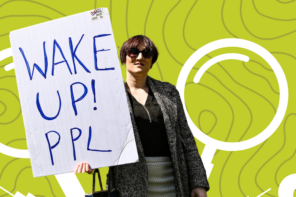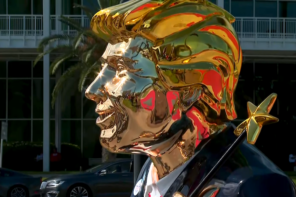According to a recent blog post by David French, former staff writer for the National Review,* there’s a simple solution to the problem of conservative, mostly white evangelicals spreading wild and harmful conspiracy theories about the coronavirus pandemic, Bill Gates, and “the deep state.”
In his view, evangelicals’ single-minded impulse toward winning at any cost in politics isn’t reflected in other aspects of their lives. “If you’re a church-going American Christian,” French tells us, “you tend to build up a reasonably robust theology of Christianity in your marriage, in your workplace, or in your school.” I don’t buy this distinction, but it is a key premise in French’s argument.
When it comes to politics, French maintains that “the theological ‘training’ consists mainly of education about issues and controversies that Christians should be aware of and concerned about.” That is, voting for candidates who are anti-choice, anti-LGBTQ equality, etc.
The solution, therefore, is for evangelicals to develop a robust “political theology,” a term with a developed presence in academic literature that French does not reference, but which he links primarily to an expanded understanding of the ninth commandment: “thou shalt not bear false witness against thy neighbor.” Christianity Today’s Ed Stetzer has invoked the same verse in opposition to the same problem of evangelical susceptibility to conspiracy theory.
It’s easy enough for these high-profile, “civil” and “respectable” evangelicals to scold their followers for “gullibility”—which, according to Stetzer is “not a spiritual gift”—or, similarly, to raise concerns about evangelicals’ “witness,” that is, how their reputation in society may bear on their ability to convert others. Not that they will listen—a solid majority of white evangelicals don’t see their support for Donald Trump as harming their witness at all.
It seems to be much more difficult, however, for these men to dig deeper into the theological roots of evangelical authoritarianism and abuse. Doing so would mean they would have to become aware of their own complicity in the very real physical and psychological harm done to those of us “raised up” to “take back this country for Christ” in the thick of the culture wars.
Take French’s reference to schools. Early last year, I sparked a media firestorm by launching the hashtag #ExposeChristianSchools in order to highlight the extent to which evangelical and fundamentalist schools in particular, like the ones I attended as a child, perpetuate abuse, racism, misogyny, and anti-LGBTQ animus as they indoctrinate children in “alternative facts.” It was Vice President Mike Pence’s and David French’s defense of Second Lady Karen Pence’s return to one such anti-LGBTQ Christian school to work as an art teacher that inspired me to create the hashtag, which accumulated over 200,000 tweets within a couple of days.
Clearly, many children of the culture wars, who have insight into why evangelicals are prone to believing in conspiracy theories, would like to be heard. And clearly, David French has little interest in listening.
I know this, because during the #ExposeChristianSchools hubbub, French took to the pages of National Review to denounce me (though not by name) as “an activist” pushing an “anti-Christian ideology.” In fact I advocate pluralism and regularly engage with Christians who support social justice and separation of church and state, for example through institutions like the Religious Coalition for Reproductive Choice and the Center for Interfaith Cooperation and Christian Theological Seminary in my native Indianapolis, as well as via podcasts and programs like Rev. Dr. Welton Gaddy’s State of Belief Radio.
But there’s little room to find common ground with right-wing Christians like French, who oppose my equal rights as a queer American, and who defend not just the right to teach children that I’m an abomination, but the supposed goodness of doing so.
And herein lies the rub. How can a man who bears false witness against people like me, which has very real consequences in terms of LGBTQ youth homelessness and suicide, insist with any credibility to his less “genteel” coreligionists that they must stop bearing false witness?
Furthermore, how can you expect evangelicals to listen to your exhortation to stop believing and spreading conspiracy theories when you simultaneously defend the very institutions that teach evangelical children to be suspicious of any and all experts from outside the evangelical community (at least on matters like evolution, psychology, gender and sexuality, abortion, and climate science), which would, of course, mean the majority of genuine experts in most fields? And yet this is precisely what evangelical schools (which usually brand themselves Christian schools or Christian academies) do, along with promoting a heavy dose of Christian nationalism.
With a Christian school education, it’s quite natural to conclude that most of the scientific community is essentially an anti-Christian conspiracy. If you need evidence for this claim, search the #ExposeChristianSchools hashtag on Twitter for numerous examples, and read this groundbreaking report by Huffington Post education reporter Rebecca Klein, from which we can extrapolate that there are roughly 2000 non-Catholic Christian elementary and secondary schools in the United States that receive public voucher funding to teach “alternative facts.” French’s hypocrisy in this regard is glaring.
As an ex-evangelical commentator on religion and politics, watching evangelical critics of Donald Trump twist themselves into contortions in attempts to explain and exhort their coreligionists has been one of the stranger phenomena of this nightmarish presidential term. We’ve seen the head of the Southern Baptist Convention’s public policy arm, Russell Moore, forced to apologize for criticizing evangelical Trump voters in order to save his job, while his fellow SBC leader Al Mohler recently repudiated his own refusal to vote for Trump in 2016, explaining that he regrets the decision. The capitulation of such institutional leaders is of course unsurprising; their positions depend directly on Trump’s most enthusiastic base: the people who fill SBC pews.
But #NeverTrump evangelicalism has survived among conservative writers and commentators like French and Stetzer, as well as Peter Wehner and Michael Gerson, both of whom played influential roles in previous Republican presidential administrations. As Trump has failed to contain the COVID-19 pandemic and done himself no favors by using brutal authoritarian tactics in response to protests for racial justice, these men have truly begun to flail as they almost literally plead with their fellow right-wing evangelicals to consider their “witness” and to stop spreading baseless and harmful conspiracy theories.
While the position they’re in is unenviable, I cannot feel sorry for these men, who are deeply invested in maintaining undeserved “respectability” for their extremist faith tradition, even as they process their loss of control over the national conversation around evangelicalism. Indeed, I’ve been working hard over the last few years to dismantle their longstanding de facto monopoly on major media representation of evangelicals, advocating for the representation of civic-minded critical researchers and former conservative Christians in discussions, which our status as stakeholders demands.
It’s unclear to me the extent to which the Wehners and Stetzers and Frenches of these United States sincerely hope to see white evangelical subculture change for the better as opposed to being concerned primarily with appearances. That is, hoping that the spotlight will go away so that the American public may once again forget about the authoritarianism and abuse that pervades evangelical communities and institutions.
But we must be clear: these horrors characterize evangelicalism precisely because they’re grounded in a (usually unspoken) white supremacist and (often explicit) patriarchal theology and concomitant hierarchical and paternalistic ethos. Prominent “respectable” evangelicals, who often tout their anti-choice credentials, share this basic theology and ethos.
The avatars of respectable evangelicalism offer us hand-wringing, prescriptive scolding, empathy for their coreligionists’ clearly bigoted fears of demographic decline (often couched in the coded language of “religious liberty”), and simple but obviously hopeless “solutions” to the problem of evangelical Trumpism.
It seems they’re willing to try anything but a long, hard look in the mirror, which is what it would take for them to criticize evangelical subculture in a credible way—though their cries would almost certainly still fall on deaf ears, as they’re clearly unable to contain the monster they helped create. “Respectable” conservative evangelicalism has always been a fig leaf. If there is one good thing to come out of the current moment, it’s that the failure of this ideological project has been laid bare for all who have eyes to see.
*Correction: David French is no longer a staff writer for the National Review, as originally stated. He left in 2019 to be senior editor of The Dispatch, a conservative news website.





